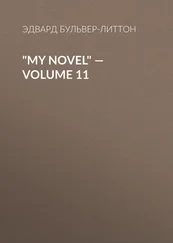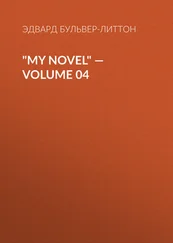Эдвард Бульвер-Литтон - My Novel — Complete
Здесь есть возможность читать онлайн «Эдвард Бульвер-Литтон - My Novel — Complete» — ознакомительный отрывок электронной книги совершенно бесплатно, а после прочтения отрывка купить полную версию. В некоторых случаях можно слушать аудио, скачать через торрент в формате fb2 и присутствует краткое содержание. Жанр: foreign_prose, literature_19, Европейская старинная литература, foreign_antique, на английском языке. Описание произведения, (предисловие) а так же отзывы посетителей доступны на портале библиотеки ЛибКат.
- Название:My Novel — Complete
- Автор:
- Жанр:
- Год:неизвестен
- ISBN:нет данных
- Рейтинг книги:5 / 5. Голосов: 1
-
Избранное:Добавить в избранное
- Отзывы:
-
Ваша оценка:
- 100
- 1
- 2
- 3
- 4
- 5
My Novel — Complete: краткое содержание, описание и аннотация
Предлагаем к чтению аннотацию, описание, краткое содержание или предисловие (зависит от того, что написал сам автор книги «My Novel — Complete»). Если вы не нашли необходимую информацию о книге — напишите в комментариях, мы постараемся отыскать её.
My Novel — Complete — читать онлайн ознакомительный отрывок
Ниже представлен текст книги, разбитый по страницам. Система сохранения места последней прочитанной страницы, позволяет с удобством читать онлайн бесплатно книгу «My Novel — Complete», без необходимости каждый раз заново искать на чём Вы остановились. Поставьте закладку, и сможете в любой момент перейти на страницу, на которой закончили чтение.
Интервал:
Закладка:
PARSON (with a look at the captain which might have become the awful brows of Jove, when about to thunder).—“That, I suppose, is the new-fashioned London play! In my time the rule was, ‘First save the game, then try to win it.’”
CAPTAIN.—“Could not save it, sir.”
PARSON (exploding)—“Not save it!—two ruffs in my own hand,—two tricks certain till you took them out! Monstrous! The rashest trump.”—Seizes the cards, spreads them on the table, lip quivering, hands trembling, tries to show how five tricks could have been gained,—N.B. It is short whist which Captain Barnabas had introduced at the Hall,—can’t make out more than four; Captain smiles triumphantly; Parson in a passion, and not at all convinced, mixes all the cards together again, and falling back in his chair, groans, with tears in his voice.—“The cruellest trump! the most wanton cruelty!”
The Hazeldeans in chorus.—“Ho, ho, ho! Ha, ha, ha!” The captain, who does not laugh this time, and whose turn it is to deal, shuffles the cards for the conquering game of the rubber with as much caution and prolixity as Fabius might have employed in posting his men. The squire gets up to stretch his legs, and, the insinuation against his hospitality recurring to his thoughts, calls out to his wife, “Write to Rickeybockey to-morrow yourself, Harry, and ask him to come and spend two or three days here. There, Mrs. Dale, you hear me?”
“Yes,” said Mrs. Dale, putting her hands to her ears in implied rebuke at the loudness of the squire’s tone. “My dear sir, do remember that I’m a sad nervous creature.”
“Beg pardon,” muttered Mr. Hazeldean, turning to his son, who having got tired of the caricatures, had fished out for himself the great folio County History, which was the only book in the library that the squire much valued, and which he usually kept under lock and key, in his study, together with the field-books and steward’s accounts, but which he had reluctantly taken into the drawing-room that day, in order to oblige Captain Higginbotham. For the Higginbothams—an old Saxon family, as the name evidently denotes—had once possessed lands in that very county; and the captain, during his visits to Hazeldean Hall, was regularly in the habit of asking to look into the County History, for the purpose of refreshing his eyes, and renovating his sense of ancestral dignity, with the following paragraph therein:
To the left of the village of Dunder, and pleasantly situated in a hollow, lies Botham Hall, the residence of the ancient family of Higginbotham, as it is now commonly called. Yet it appears by the county rolls, and sundry old deeds, that the family formerly styled itself Higges, till the Manor House lying in Botham, they gradually assumed the appellation of Higges-in-Botham, and in process of time, yielding to the corruptions of the vulgar, Higginbotham.”
“What, Frank! my County History!” cried the squire. “Mrs. H., he has got my County History!”
“Well, Hazeldean, it is time he should know something about the county.”
“Ay, and history too,” said Mrs. Dale, malevolently, for the little temper was by no means blown over.
FRANK.—“I’ll not hurt it, I assure you, sir. But I’m very much interested just at present.”
THE CAPTAIN (putting down the cards to cut).—“You’ve got hold of that passage about Botham Hall, page 706, eh?”
FRANK.—“No; I was trying to make out how far it is to Mr. Leslie’s place, Rood Hall. Do you know, Mother?”
MRS. HAZELDEAN.—“I can’t say I do. The Leslies don’t mix with the county; and Rood lies very much out of the way.”
FRANK.—“Why don’t they mix with the county?”
MRS. HAZELDEAN.—“I believe they are poor, and therefore I suppose they are proud; they are an old family.”
PARSON (thrumming on the table with great impatience).—“Old fiddle-dee!—talking of old families when the cards have been shuffled this half-hour!”
CAPTAIN BARNABAS.—“Will you cut for your partner, ma’am?”
SQUIRE (who has been listening to Frank’s inquiries with a musing air).—“Why do you want to know the distance to Rood Hall?”
FRANK (rather hesitatingly).—“Because Randal Leslie is there for the holidays, sir.”
PARSON.—“Your wife has cut for you, Mr. Hazeldean. I don’t think it was quite fair; and my partner has turned up a deuce,—deuce of hearts. Please to come and play, if you mean to play.”
The squire returns to the table, and in a few minutes the game is decided by a dexterous finesse of the captain against the Hazeldeans. The clock strikes ten; the servants enter with a tray; the squire counts up his own and his wife’s losings; and the captain and parson divide sixteen shillings between them.
SQUIRE.—“There, Parson, I hope you’ll be in a better humour. You win enough out of us to set up a coach-and-four.”
“Tut!” muttered the parson; “at the end of the year, I’m not a penny the richer for it all.”
And, indeed, monstrous as that assertion seemed, it was perfectly true, for the parson portioned out his gains into three divisions. One-third he gave to Mrs. Dale, for her own special pocket-money; what became of the second third he never owned even to his better half,—but certain it was, that every time the parson won seven-and-sixpence, half-a-crown, which nobody could account for, found its way to the poor-box; while the remaining third, the parson, it is true, openly and avowedly retained; but I have no manner of doubt that, at the year’s end, it got to the poor quite as safely as if it had been put into the box.
The party had now gathered round the tray, and were helping themselves to wine and water, or wine without water,—except Frank, who still remained poring over the map in the County History, with his head leaning on his hands, and his fingers plunged in his hair.
“Frank,” said Mrs. Hazeldean, “I never saw you so studious before.”
Frank started up and coloured, as if ashamed of being accused of too much study in anything.
SQUIRE (with a little embarrassment in his voice).—“Pray, Frank, what do you know of Randal Leslie?”
“Why, sir, he is at Eton.”
“What sort of a boy is he?” asked Mrs. Hazeldean.
Frank hesitated, as if reflecting, and then answered, “They say he is the cleverest boy in the school. But then he saps.”
“In other words,” said Mr. Dale, with proper parsonic gravity, “he understands that he was sent to school to learn his lessons, and he learns them. You call that sapping? call it doing his duty. But pray, who and what is this Randal Leslie, that you look so discomposed, Squire?”
“Who and what is he?” repeated the squire, in a low growl. “Why, you know Mr. Audley Egerton married Miss Leslie, the great heiress; and this boy is a relation of hers. I may say,” added the squire, “that he is a near relation of mine, for his grandmother was a Hazeldean; but all I know about the Leslies is, that Mr. Egerton, as I am told, having no children of his own, took up young Randal (when his wife died, poor woman), pays for his schooling, and has, I suppose, adopted the boy as his heir. Quite welcome. Frank and I want nothing from Mr. Audley Egerton, thank Heaven!”
“I can well believe in your brother’s generosity to his wife’s kindred,” said the parson, sturdily, “for I am sure Mr. Egerton is a man of strong feeling.”
“What the deuce do you know about Mr. Egerton? I don’t suppose you could ever have even spoken to him.”
“Yes,” said the parson, colouring up, and looking confused. “I had some conversation with him once;” and observing the squire’s surprise, he added—“when I was curate at Lansmere, and about a painful business connected with the family of one of my parishioners.”
Читать дальшеИнтервал:
Закладка:
Похожие книги на «My Novel — Complete»
Представляем Вашему вниманию похожие книги на «My Novel — Complete» списком для выбора. Мы отобрали схожую по названию и смыслу литературу в надежде предоставить читателям больше вариантов отыскать новые, интересные, ещё непрочитанные произведения.
Обсуждение, отзывы о книге «My Novel — Complete» и просто собственные мнения читателей. Оставьте ваши комментарии, напишите, что Вы думаете о произведении, его смысле или главных героях. Укажите что конкретно понравилось, а что нет, и почему Вы так считаете.












